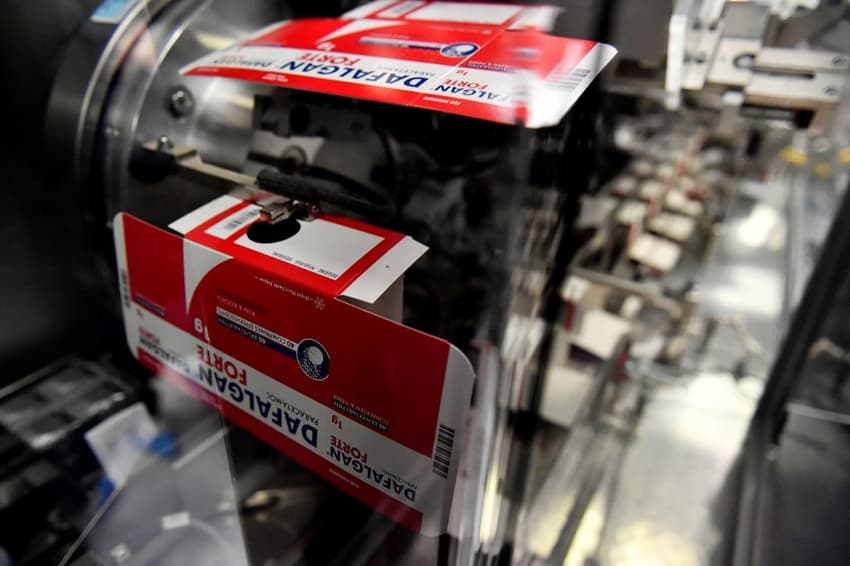Switzerland to limit sales of painkillers during coronavirus crisis

The Federal Council limits the purchase of drugs based on paracetamol, aspirin, ibuprofen, and codeine.
Pharmacies are now only allowed to sell one package per customer.
The new regulation, which will be in force for six months, concerns a series of medicines based on acetylsalicylic acid (aspirin) calcium carbasalate, metamizole, paracetamol, ibuprofen, diclofenac, mefenamic acid, codeine, noscapine, dextromethorphan, and opiates.
#DécisionCF L'approvisionnement en médicaments est garanti, l'importation et la production fonctionnent normalement. Afin d'assurer un approvisionnement régulier dans tout le pays, le Conseil fédéral a décidé de limiter la vente de certains médicaments. #CoronaInfoCh (BK)
— André Simonazzi (@BR_Sprecher) March 18, 2020
These substances are found in popular medications sold in Switzerland under the brand names Tylenol, Dafalgan, Irfen, Algifor, Alcacyl, and Voltaren.
They are commonly taken to treat pain, fever, and inflammation.
READ MORE: Coronavirus fake news watch: No, Swiss hospitals are not overrun
Excluded from the rule are patients with chronic conditions, who will only be able to obtain these medications by doctor’s prescription in the quantity necessary to cover a maximum of two months.
Health authorities warn that patients infected with coronavirus should abstain from using anti-inflammatories containing ibuprofen, such as Irfen and Algifor, as these medications could exacerbate lung infections.
READ ALSO: France and the WHO warn against taking anti-inflammatories for coronavirus fever
Le recours à des anti-inflammatoires (ibuprofène, kétoprofène, naproxène, diclofénac, etc.) ou aux dérivés de la cortisone est déconseillé en cas d’état grippal possiblement causé par le COVID-19. En cas de fièvre grave requérant un traitement, le paracétamol est seul recommandé.
— CHUV | Lausanne (@CHUVLausanne) March 15, 2020
Switzerland's confirmed Covid-19 cases now number 3,028, although the real figure is likely much higher given not every suspected case is being tested.
To curb the further spread of coronavirus, the Federal Council declared on Monday a state of emergency
READ MORE: UPDATE: Switzerland declares state of emergency over coronavirus
All public or private events are prohibited.
"All shops, markets, restaurants, bars, entertainment and leisure establishments such as museums, libraries, cinemas, concert halls, theatres, sports centres, swimming pools and ski areas are closed", the government said.
Food shops, petrol stations, hotels, banks and post offices are among the facilities that will remain open.
The restrictions also include school closures and stricter controls at all borders.
Comments
See Also
Pharmacies are now only allowed to sell one package per customer.
The new regulation, which will be in force for six months, concerns a series of medicines based on acetylsalicylic acid (aspirin) calcium carbasalate, metamizole, paracetamol, ibuprofen, diclofenac, mefenamic acid, codeine, noscapine, dextromethorphan, and opiates.
#DécisionCF L'approvisionnement en médicaments est garanti, l'importation et la production fonctionnent normalement. Afin d'assurer un approvisionnement régulier dans tout le pays, le Conseil fédéral a décidé de limiter la vente de certains médicaments. #CoronaInfoCh (BK)
— André Simonazzi (@BR_Sprecher) March 18, 2020
These substances are found in popular medications sold in Switzerland under the brand names Tylenol, Dafalgan, Irfen, Algifor, Alcacyl, and Voltaren.
They are commonly taken to treat pain, fever, and inflammation.
READ MORE: Coronavirus fake news watch: No, Swiss hospitals are not overrun
Excluded from the rule are patients with chronic conditions, who will only be able to obtain these medications by doctor’s prescription in the quantity necessary to cover a maximum of two months.
Health authorities warn that patients infected with coronavirus should abstain from using anti-inflammatories containing ibuprofen, such as Irfen and Algifor, as these medications could exacerbate lung infections.
READ ALSO: France and the WHO warn against taking anti-inflammatories for coronavirus fever
Le recours à des anti-inflammatoires (ibuprofène, kétoprofène, naproxène, diclofénac, etc.) ou aux dérivés de la cortisone est déconseillé en cas d’état grippal possiblement causé par le COVID-19. En cas de fièvre grave requérant un traitement, le paracétamol est seul recommandé.
— CHUV | Lausanne (@CHUVLausanne) March 15, 2020
Switzerland's confirmed Covid-19 cases now number 3,028, although the real figure is likely much higher given not every suspected case is being tested.
To curb the further spread of coronavirus, the Federal Council declared on Monday a state of emergency
READ MORE: UPDATE: Switzerland declares state of emergency over coronavirus
All public or private events are prohibited.
"All shops, markets, restaurants, bars, entertainment and leisure establishments such as museums, libraries, cinemas, concert halls, theatres, sports centres, swimming pools and ski areas are closed", the government said.
Food shops, petrol stations, hotels, banks and post offices are among the facilities that will remain open.
The restrictions also include school closures and stricter controls at all borders.
Join the conversation in our comments section below. Share your own views and experience and if you have a question or suggestion for our journalists then email us at [email protected].
Please keep comments civil, constructive and on topic – and make sure to read our terms of use before getting involved.
Please log in here to leave a comment.